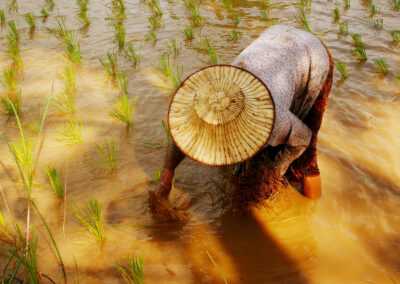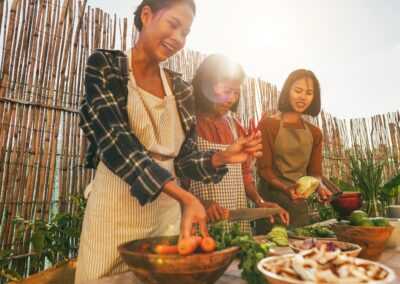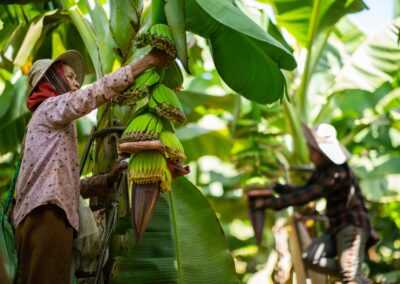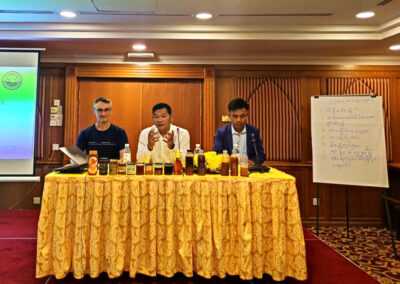Small impulse, big impact
Sometimes all it takes is a small incentive for a big change, says Kim Lape with a smile on his face. He knows well what he’s talking about. Just one and a half year ago, the 43-year-old farmer grew vegetables on his farm in the Mondulkiri province in eastern Cambodia in the conventional way. ‘It was expensive. We used enormous amounts of water for irrigation and far too many chemicals. All to achieve the highest possible harvest yields’, says Lape. In the end, the bill didn’t add up because the yields couldn’t compensate for the high production costs, not to mention the environmental impacts and the soil degradation.
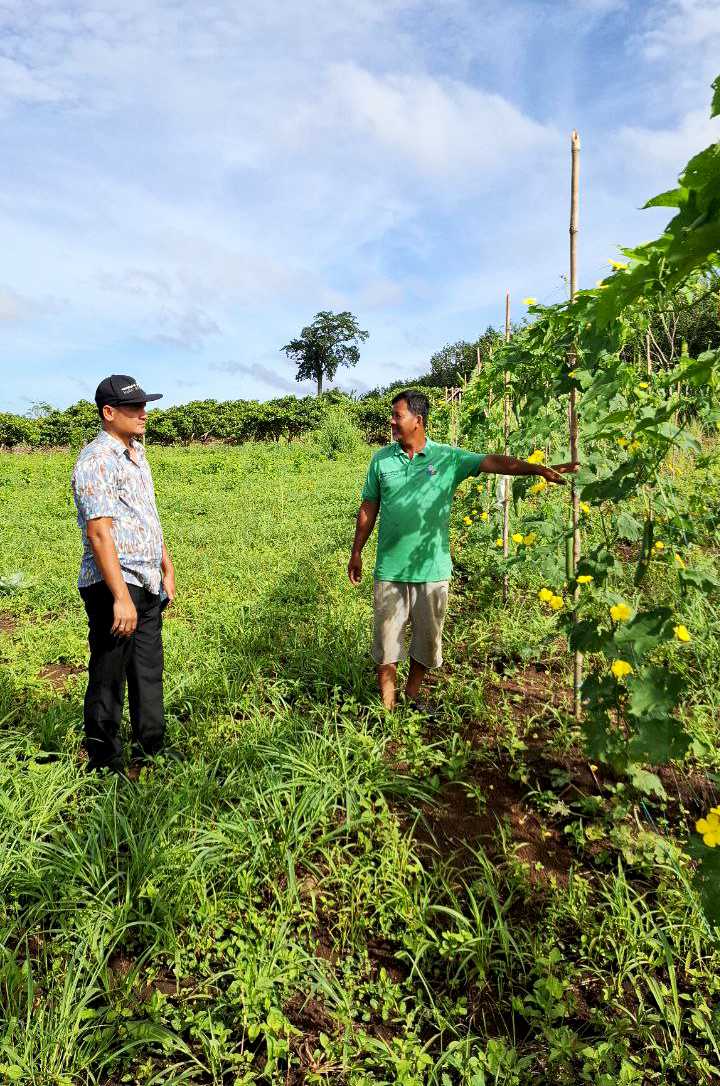
From farm to fork
For farmer Lape, farming his vegetables fundamentally changed in April 2024. As part of the Future Food Together initiative (FFT), WWF organised workshops in Cambodia’s capital Phnom Penh on sustainable agricultural practices and invited the local farmers’ associations in the province to attend. The training was financed by the International Climate Initiative (IKI), one of the most important instruments of the German Federal Ministry for the Environment, Nature Conservation, Nuclear Safety and Consumer Protection (BMUV) for the international financing of climate protection, adaptation and biodiversity conservation, through project funding granted to WWF.
For Lape, the training was a game changer in his career. Together with 197 other farmers in the region, he learnt how to replace chemicals with compost and that this ultimately leads to more fertile and healthier soils. Or, for example, how important the role of a middleman can be in local marketing. By involving other farmers, collecting their vegetables, and bringing them to the local market, more profits can be made for everyone and competition between farmers can be avoided. Back on his farm in Mondulkiri, Lape tried out what he had learnt. And it worked! The success was already evident in the first season. ‘We were able to bring more vegetables to market while protecting our soils. We now harvest and collect all available local veggies, around 14 tonnes more from our fields and have even earned 5.200 USD more than the 1.800 USD before the workshops due to the more efficient farming methods.’

The Future Food Together initiative in Cambodia is part of a global network of six countries in Asia and Latin America. FFT‘s core message: to demonstrate innovative, holistic approaches to the production, distribution and consumption of foods – beyond just farm to fork. Food must be healthy for people and the planet to mitigate the climate crisis.
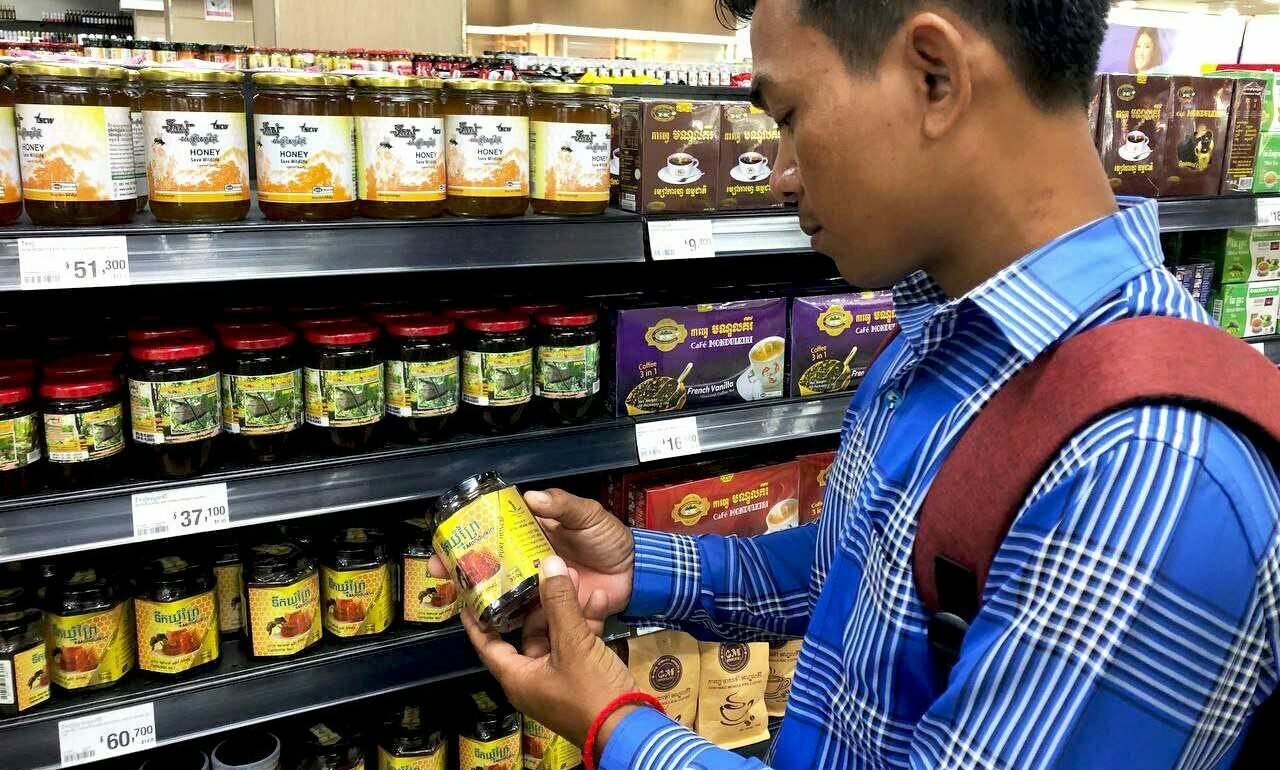
There was more for our families
The 37-year-old farmer Sreov Sovanny from Mondulkiri also benefited from the FFT workshops. He manages the Mondulkiri Wild Honey Conservation Association and is Vice President of the Wild Honey Group in Cambodia. He supervises a harvesting team that is responsible for collecting wild honey from 500 hectares of forest land. As the manager of the association, Sovanny oversees the implementation of sustainable practices he has learnt in the workshops and ensures that the harvesting process is clean, efficient, and protecting the bees in their habitat. ‘Instead of exploiting the bees and collecting all the honey from the nests as we used to, we now leave some honey to the bees,’ says Sovanny. In addition, the beekeepers no longer use conventional beehive practices, such as smokers, because fire often used to lead to forest fires. Sovanny nowadays trains his team himself not to use open fires and to maintain high standards of hygiene during harvesting. His patrol team relentlessly monitors the forest to rule out the risk of fires and to guarantee hygienic harvesting and storage practices for the honey.
Farmer Lape from Mondulkiri also shared his newly acquired knowledge – first with his neighbours and then with the entire village community. ‘They were sceptical at first but saw that we produced better crops with our sustainable methods and that there was more for our families in the end,’ says the farmer. That was enough to convince others.
Future Food Together Initiative supports World Food Day 2024 with its agenda – The right to food for a better life and a better future, as an important pillar of SDG 12.
We re-design entire food systems and value chains – away from ecosystem destruction and degradation, monocultures, excessive and uncontrolled use of harmful agrochemicals – towards nature-positive agroecological and organic farming, forest restoration, and creating access to local markets and supply chains – from farm to fork. Food must be healthy for people and the planet.
The Future Food Together Initiative was developed to answer the urgent need to build resilient food systems that are healthy for people and the planet, and to work on reorienting our relationship with food and with nature. As food systems are complex, solutions need to take a holistic approach, considering all the interrelated elements and actors in the food system, from production to consumption and beyond. In upcoming stories, we will give insight into the different dimensions of our initiative, e.g., working with different stakeholder groups such as political decision-makers and national governments, companies and value chain actors, as well as consumers, multipliers, and the public. Each stakeholder group requires specific tools and measures to integrate them into our activities. We will also give more explanations on how food systems are currently contributing to climate change and environmental degradation, and we will explain our approaches to remedying these problems, working along entire value chains, to set up sustainable food systems. Stay tuned for more stories on these components of our initiative!


